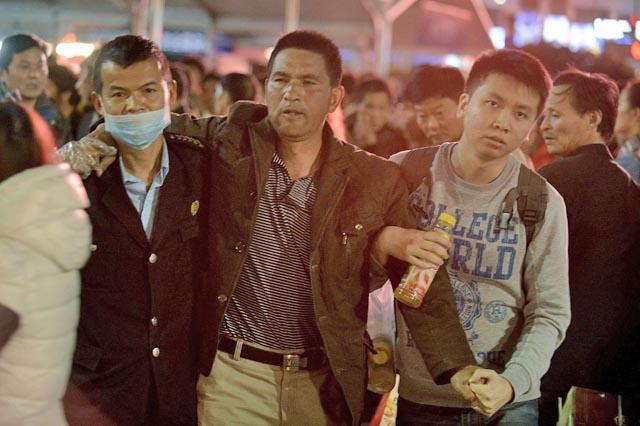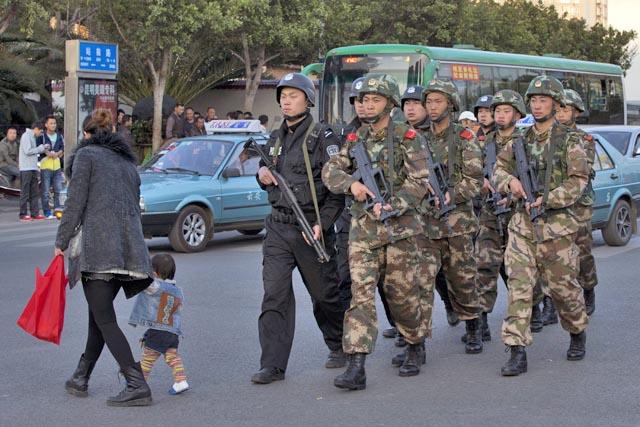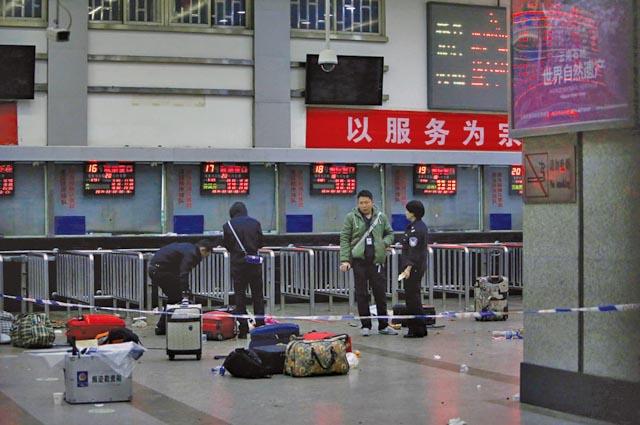You are here
China vows to punish deadly station rampage, blames separatists
By AFP - Mar 02,2014 - Last updated at Mar 02,2014

KUNMING, China — China Sunday promised tough punishment for knife-wielding attackers who killed 29 people in an unprecedented train station rampage, blaming separatists from Xinjiang, as witnesses described a city in shock.
Victims spoke of black-clad attackers slashing indiscriminately as people queued to buy tickets late Saturday at Kunming station, in an incident that lasted about half an hour.
More than 130 were wounded in the attack in the city in the southwestern province of Yunnan, prompting shock and outrage nationwide. Buses and taxis ferried people to hospital.
A shop worker told AFP some of the victims took refuge in her store.
“Many were crying and some looked like they had been cut. We were terrified. Everyone in Kunming is still in shock,” she said.
Police shot dead at least four attackers, arrested one and were hunting for more, said the official Xinhua news agency, which in a commentary called the incident “China’s 9/11” and a “severe crime against the humanity”.
China’s security chief Meng Jianzhu, who rushed to Kunming to oversee the operation, promised “all-out efforts” to “severely punish terrorists according to the law”, Xinhua said.
He “urged forcible measures to crack down on violent terrorism activities”, it added.
The Kunming city government said the attack was orchestrated by separatists from the northwest region of Xinjiang, Xinhua reported.
Xinjiang, a vast area home to the mostly-Muslim Uighur minority, is periodically hit by violent clashes between locals and security forces but attacks targeting civilians are rarer.
Attacks are almost unheard of in Yunnan, more than 1,600 kilometres from Xinjiang and a popular tourist destination.
The attack comes months after three members of the same Xinjiang family crashed their car into crowds of tourists in Tiananmen Square in Beijing, the symbolic heart of the Chinese state, killing two people. They then set the vehicle on fire, killing themselves, according to authorities.
It also came days before delegates from across the communist-ruled country gather in Beijing for the annual meeting of the National People’s Congress, the rubber-stamp parliament.
Major Chinese train stations have security and identity checkpoints on entry.
Barry Sautman, an expert on ethnic politics in China at Hong Kong University of Science and Technology, said the attack had “high symbolic value”.
“It shows that the organisation that carried it out is able to strike anywhere,” he told AFP.
‘Stabbing whoever
they saw’
Victim Yang Haifei, who was wounded in the chest and back, told Xinhua he had been buying a ticket when the attackers approached.
“I saw a person come straight at me with a long knife and I ran away with everyone,” he said, while others “simply fell on the ground”.
Some who escaped were desperately searching for missing loved ones.
“I can’t find my husband, and his phone went unanswered,” Yang Ziqing was quoted as saying.
She had been waiting for her train to Shanghai when a knife-wielding man suddenly came at them, she said.
The attackers were dressed in similar black clothing, the semiofficial China News Service said, citing witnesses.
“A group of men carrying weapons burst into the train station plaza and the ticket hall, stabbing whoever they saw,” it said.
Photos posted on Sina Weibo — a Chinese version of Twitter — showed blood spattered across the station floor and medical staff crouching over bodies lying on the ground, although the images’ authenticity could not be verified.
Pictures on news portal 163.com also showed what it claimed was one of the attackers, lying on a stretcher surrounded by police.
Other online images showed spectacles, shoes and baggage strewn across the floor of the waiting room, behind police tape.
None of the victims were foreigners, Xinhua quoted officials as saying.
President Xi Jinping called for “all-out efforts” in the investigation and for the attackers to be punished “in accordance with the law”, the agency said.
UN Secretary General Ban Ki-moon condemned “in the strongest terms” the “terrible attack on civilians”, his spokesman said in a statement, adding he “hopes that those responsible will be brought to justice”.
‘They will go to hell’
Many Weibo users expressed outrage. “Targeting ordinary people in a terrorist attack is disgraceful,” said one. “They have nothing to do with this issue.”
Li Chengpeng, a social commentator and government critic who has more than seven million followers, said: “No matter who did this, for what purpose, and no matter which race, to target innocent people at a train station is an evil choice. Their hearts will be punished and they will go to hell.”
Xinhua said in a commentary that the attack had shrouded “the whole nation in terror”.
“Mothers, sons and daughters were slaughtered by strangers,” it said. “Nothing justifies such a carnage against innocent civilians. A nationwide outrage has been stirred.”
Beijing maintains that unrest in Xinjiang is caused by terrorist groups seeking independence, including the overseas-based East Turkestan Islamic Movement.
But its strength and links to global terrorism are murky, and some experts say China exaggerates the threat to justify tough security measures in Xinjiang, where rights groups complain of widespread religious repression and economic discrimination.
In an e-mailed statement, Dilshat Raxit of the exiled World Uyghur Congress said there was “no justification for attacks on civilians” but added that discriminatory and repressive policies provoked “extreme measures” in response.
Related Articles
Defiant residents of the Chinese city where 29 people died in a mass stabbing queued to donate blood Monday, while others vented anger at what authorities say was a terrorist attack by separatists from Xinjiang.
At least 28 people were killed in a “violent terrorist attack” at a train station in the southwestern Chinese city of Kunming by a group of unidentified people brandishing knives, five of whom were shot dead, state media said on Sunday.
A city in China’s restive western region of Xinjiang has banned people with head scarves, veils and long beards from boarding buses, as the government battles unrest with a policy that critics said discriminates against Muslims.













